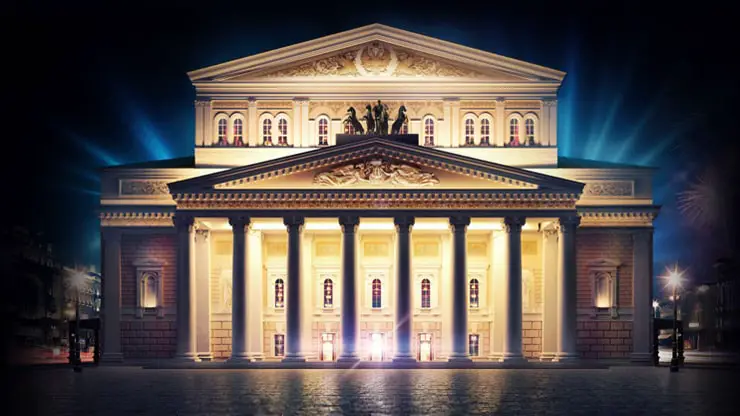Russia is known for its theater and ballet. Take advantage and see all that you can while here.
You can buy tickets at the theater or concert hall itself or from a reseller such as Parter or Ponominalu, which allow you to reserve tickets pick them up at location near you or even have them delivered. There are also various kiosks around central Moscow that sell theater tickets for multiple theaters.
Listed below are a few recommendations for theater outings in Moscow. For more recommendations on what to do in Russia’s capital, see our Guide to Moscow.
The Bolshoi Theater

The Bolshoi’s tradition of excellence goes back to 1776. Unfortunately, as the number of tourists in Moscow has grown, so have ticket prices to the Bolshoi; it’s on everyone’s must-see list. Thus, while productions are exquisite (as is the building itself), you’ll often find that tickets to major performances in the historic building are sold out almost as soon as they go on sale and when they are available, are prohibitively expensive (~$100-200). To get such tickets, plan well in advance, be online as soon as tickets go on sale (two months before performance), and plan to pay heavily.
For cheaper seats, you might look at going to the “new stage” of the Bolshoi – this is a separate building, built next door to the Bolshoi, that looks just like a slightly smaller Bolshoi inside and out. It still features Bolshoi dancers, musicians, and singers. It was built in 2002 to house the company’s productions while the Bolshoi was undergoing major renovations. Tickets there tend to run about ~$25-30 for the nosebleed sections. You might also look for smaller shows, concerts, or traveling shows that occur on the Bolshoi main stage which also tend to be cheaper than headliner productions.
See Bolshoi.ru for the current schedule.
Recommended Productions:
Swan Lake (“Лебединое озеро”)
The Bright Stream (“Светлый ручей”) – on the New Stage – a hilarious Soviet-era piece
Spartacus (“Спартак”) – A stunning soviet-era ballet about proletarian revolt that is still popular with Muscovites
The Kremlin Palace Theater
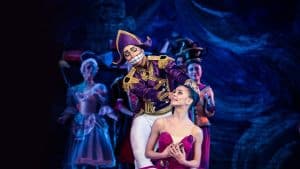
For a great ballet experience without the headache and expenses of the Bolshoi, try the Kremlin Palace, which is actually inside the Kremlin Walls. Its enormous building was originally built to house the Soviet Congress of People’s Deputies and is still used for important government meetings. The location is facinating and the performances themselves are also competitive with the Bolshoi in terms of quality and production values. The main difference is that, given the size of the facility, it’s almost never sold out and can afford maintain relatively low prices for individual tickets. Very good seats in the balconies can be had for $10-25, even for headliner shows.
See Kremlinpalace.org for the current schedule.
Recommended Productions:
Swan Lake (“Лебединое озеро”)
The Snow Maiden (“Снегурочка”) An excellent and fascinating work by Tchaikovsky based on Russian folklore.
The Chekhov Moscow Art Theater (MXAT)
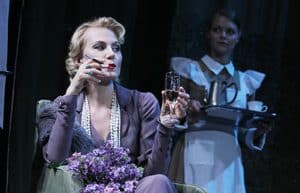
Most American universities, Hollywood directors and acting coaches teach acting according to the “Method.” Method Acting has something of a convoluted history – but it was born from the ideas of Konstantine Stanislavski, a great theater director and theoretician, who developed and tested them at the Moscow Art Theater. For this reason, the theater is something of a mecca for theater practitioners. It continues to use Stanislavski’s methods today, and to great success. If you can’t get into the main stage, the theater also runs a school with a smaller studio in the same complex that offer productions in Russian and English (run in part by American actors who attend study programs there). Incidentally, the theater is named for Chekhov because this is where he got his start as a successful playwright (with The Seagull). There is another Moscow Art Theater (named for M. Gorky) that is known for keeping alive the practices of Socialist Realism. While this is interesting to see in its own right, it’s completly different from the Chekhov.
See MXAT.ru for the current schedule.
Recommended productions:
The White Guard (“Белая гвардия”) by M. Bulgakov
The Cherry Orchard (“Вишневый сад”) or The Seagull (“Чайка”) by A. Chekhov
S. V. Obraztsov Puppet Theater
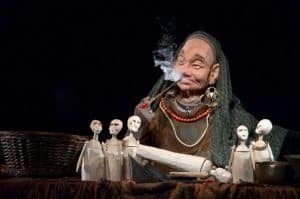
I know what you’re thinking, but this is puppet theater like you’ve never imagined it, with incredible sets and acting that will knock your socks off. In some shows, you might watch one man perform perhaps 12 roles, some himself, some with puppets he controls. In others, you’ll watch puppets act out harrowing scenes from Russian history, accompanied by strains from major Russian rock groups. You’ll be surprised how quickly you forget that it’s “just a puppet” and start becoming involved in the action. Note that the daytime matinees are fluffy children’s pieces (and not so highly recommended). The evening productions can be very serious and even racy and are generally incredible.
See Puppet.ru for the current schedule.
Recommended productions:
Nobody Nose (“Некто Нос”) by N. Gogol
Leningrader (“Ленинградка”) – An original show about the siege of Leningrad
The Russian National Show
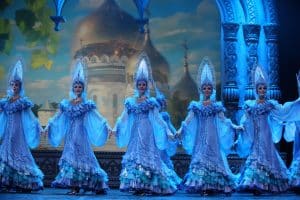
This creative, well-funded dance company puts on one of the best shows in Moscow. It’s traditional, high-energy Russian folk dance meets Las-Vegas-style flash. Complete with laser shows, image projections, and strikingly beautiful sets and costumes, this show comes highly recommended. It has managed to gain such a reputation, that it gained funding to build its own Theater, The Russian National Folk Theater, and move there from its former stomping grounds on a stage inside the Cosmos Hotel. The Folk Theater offers a range of other productions, but if you have time to attend only one, The Russian National Show is really the one you want.
See NationalRussianShow.ru for the current schedule.
Mossoviet Theater
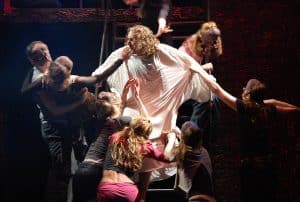
Founded in 1929 as the Theater of the Moscow Trade Unions, the original mission of this theater was to provide “inexpensive performances for simple audiences,” reflecting, most likely, Lenin’s declaration that art should resemble “the simple black bread of the peasantry.” Renamed in 1938 as Mossoviet (short for Moscow Soviet), this theater has kept its Soviet era name, which has always been associated with productions of high artistic standards. In the 1990s, it became one of the first Moscow theaters to gain a reputation for truely high quality productions of previously censored art. Its production of Jesus Christ Superstar, for instance, is still running more than two decades after it premiered – and still holds its popularity and reputation.
See Mossoveta.ru for the current schedule.
Recommended productions:
Jesus Christ, Superstar (“Иисус Христос – суперзвезда”) American rock opera!
King Lear (“Король Лир”) – an updated, translated version of Shakespeare’s classic.
The White Guard (“Бeлая гвардия”) by M. Bulgakov
The School of Modern Drama
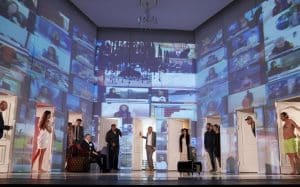
The School of Modern Drama is a professional theater focusing on modern productions. One of its main authors, Evgenii Grishkovits, is a modern author of plays and novels who strives to write in clear, modern Russian; he writes Russian characters in the way modern Russians actually speak. His writing is also relatively simple – we’ve found that intermediate language students can generally follow him relatively well in both reading and listening. Productions are often highly modern, with projections and lots of visuals, or very simple black box affairs where you are essentially listening to characters tell you a story.
See Neglinka29.ru for the current schedule.
Recommended productions:
The City (“Город”) or The House (“Дом“) by A. Greshkovits
Russian Jam (“Русское варенье”) by L. Ulitskaya
The Stanislavsky ElectroTheater
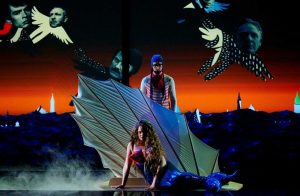
The Stanislavsky ElectroTheater is housed the completely reconstructed and now heavily mechanized former premises of the Stanislavsky Drama Theater. Since its reopening, the Theater has gained a fast, international reputation. It often stages classical plays in ways that use the theater’s technology and flexible spaces along with a highly creative and modern production methods to reimagine, deconstruct, and/or simply breathe new life into art.
See ElectroTheater.com for the current schedule.
Recommended Productions:
Drillalians (highly modern opera)
The Blue Bird (a modern take on Maeterlinck’s classic)
The Maly Theater
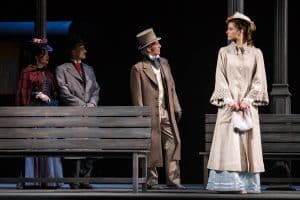
The appropriately named little sister of the Bolshoi (“Bolshoi” means “big” and “Maly” means “small”), this theater lies just next door to the Bolshoi on Theater Square. Most Russians consider it one of Moscow’s most boring, since it clings to “classical” or “academic” productions. However, if you are interested in classic Russian plays, this is definitely the place to come see them. American students of Russian may find the performances interesting, if not for the novelty (classical acting in America is quite rare), but also for the fact that classical actors speak very clearly and loudly (it’s easy to understand them).
See Maly.ru for the current schedule.
Recommended productions: Anything by Ostrovsky, Chekhov, or Shakespeare.
You Might Also Like
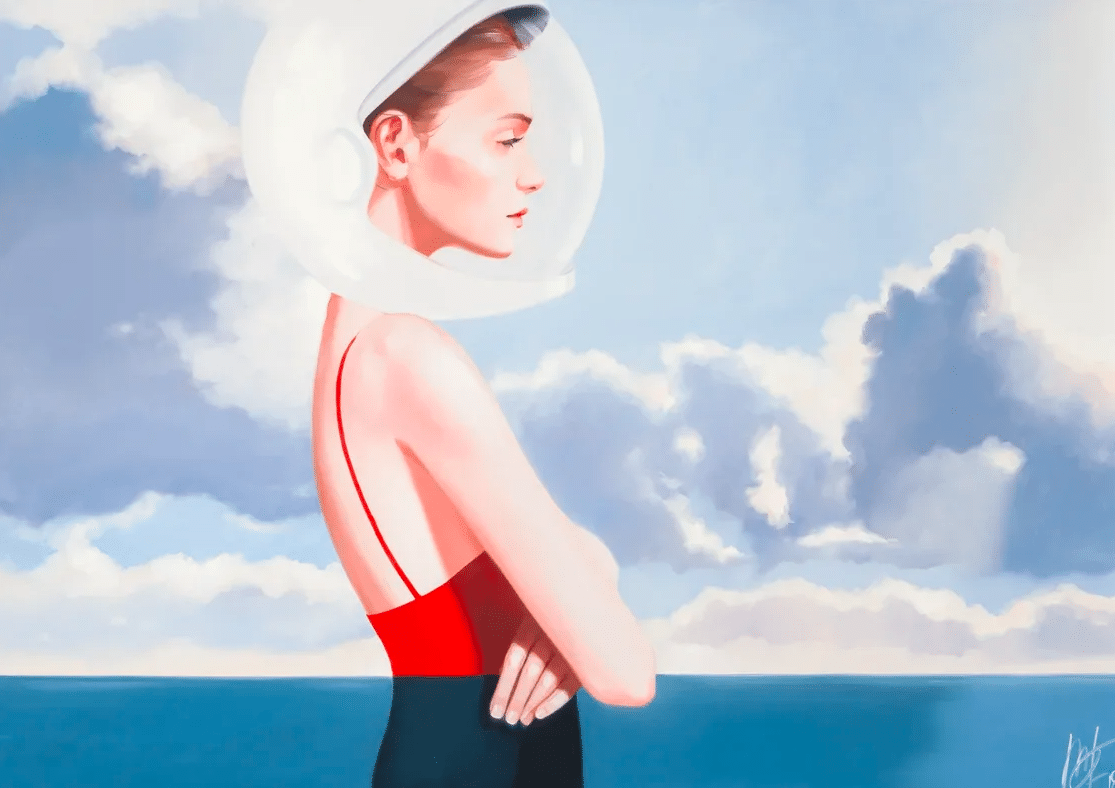
Seven Critically Acclaimed Modern Russian Artists
The following are six modern Russian artists who have left their mark on not only modern Russian art, but who are also known beyond Russia’s borders as well. Each has gathered critical acclaim and, as is always the case in the art world, at least some critical derision. Not all are ethnic Russians – but […]
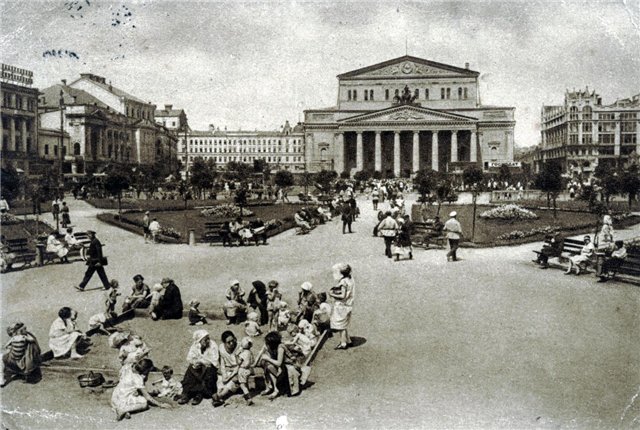
Moscow’s Theater Square: History in Old Photos
Moscow’s Theater Square is not only one of the most beautiful and popular squares, but also one of the oldest. There are three Theaters in total that surround the square—the Bolshoi, the Maly, and the Russian Youth Theaters. At the beginning of the 19th century, the square was named Petrovskaya Square, after the nearby Petrovka […]
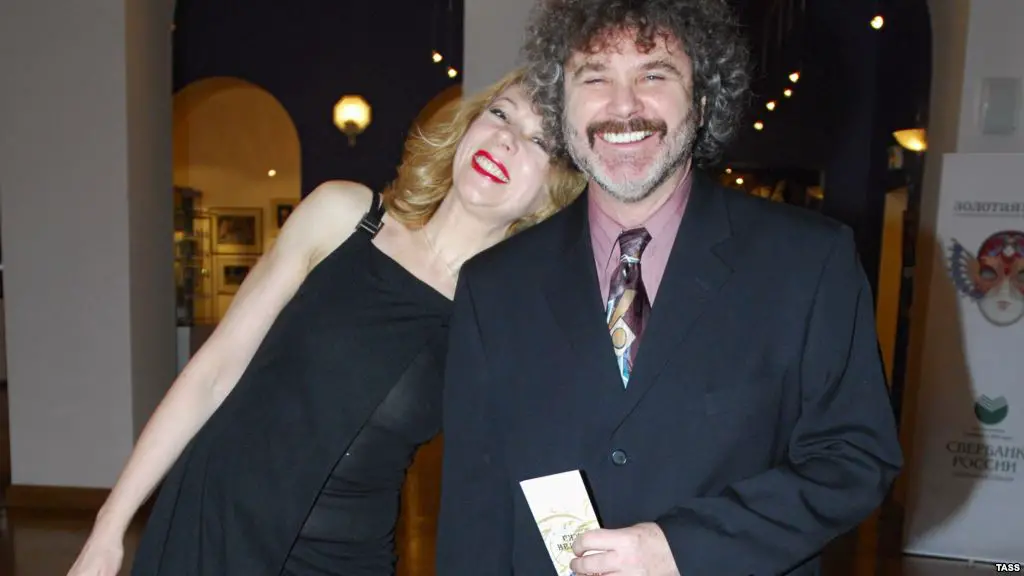
John Freedman: Man of the Newspaper, Theater, etc
John Freedman first came to Moscow in 1988 to research his dissertation for a Ph.D in Russian Literature. He found out a lot. He also found a woman he loves and some incredible professional and personal opportunities. He is now an editor for Moscow’s largest English-language newspaper, a published author and translator, and has been […]


